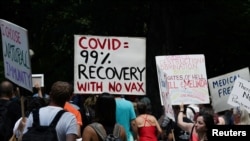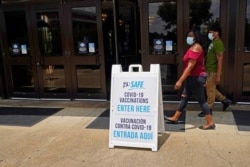Student Union
Students Across US Take On COVID Disinformation

A student organization is trying to combat misinformation about COVID-19 and pandemic on American campuses through social media.
COVID Campus Coalition’s mission is to dispel “misconceptions surrounding COVID vaccines by providing students with weekly digestible scientific summaries through a plethora of virtual and in-person platforms,” according to its website.
“Look at the comments of an Instagram post about the vaccine and you have people spouting myths and conspiracies about the virus,” said sophomore James Lifton of Edinburgh, Scotland, a political science major, who has teamed up with COVID Campus Coalition on his campus, Texas A&M (TAMU).
Social media has been rife with inaccurate and misinformed opinions at the same time more than 150 studies have been retracted about COVID, leading some people to feel confused or alienated about what information is real and true, and what is fabricated or political.
On its website and social media accounts, COVID Campus Coalition pushes accurate information to its audience from the Centers for Disease Control and Prevention in Atlanta, and scientific articles by medical professionals released through New England Journal of Medicine, Harvard Medicine, University of Chicago Medicine and MedRxiv.
There are 23 Campus Coalition chapters across the United States, including Rutgers University in New Jersey, University of Florida, University of Southern California and Cornell University in New York.
Student ambassadors like Lifton “reach out to the community through spreading statistics and posts about debunking common myths of the vaccine,” he said.
“I hope that this project can push more young people to get the vaccines to help assist with herd immunity, as well as start conversations about what the vaccine is for young people,” Lifton said.
Another wave of increased cases is making its way across the U.S., this time via the highly transmissible delta variant, according to the Centers for Disease Control and Prevention in Atlanta. The Delta variant is to blame for 80% of all new COVID cases, the agency reported.
At TAMU, 10,772 people have been vaccinated through Student Health Services, only 15% of the student population.
“If this account can convince just one Aggie to get vaccinated, I would see it as a success,” said TAMU junior Sadie Hurst, referring to the nickname for the TAMU student body. “If it can convince one Aggie to get vaccinated, what’s to stop it from convincing hundreds?”
Approximately 54.9% of individuals aged 18-24 have received at least one dose of the COVID vaccine in the United States, while 44.6% of individuals of the same age have been fully vaccinated, according to Mayo Clinic’s vaccine tracker as of August 9. Among 25- to 39-year-olds, 58.7% have received at least one dose, while 49.2% have been fully vaccinated.
“There is an ideological divide on my campus,” Lifton said. “Having people be on board with getting the vaccine will be difficult. I believe this is the right move in order to ensure that cases at college do not continue rising as we go back in person. It will be difficult but I believe that it is possible.”
Olivia Nicholson is a student on the other side of the divide. The freshman at Belmont University in Nashville said she has chosen not to be inoculated.
“It just doesn’t seem that effective,” Nicholson said. “There is no guarantee that if you receive the vaccine you will not contract COVID. I feel like if I still have to wear a mask — and there is no guarantee that I will not contract COVID — then I won’t put something in my body without knowing exactly what effect it could have on me.”
According to the CDC, “COVID-19 vaccines are effective at keeping you from getting COVID-19, especially severe illness and death. COVID-19 vaccines reduce the risk of people spreading the virus that causes COVID-19.”
“If you are fully vaccinated, you can resume activities that you did before the pandemic,” it states on its website.
Those activities include returning to college campuses. A year and a half into the pandemic that is believed to have spread from China in late 2019, students have endured more than a year of campus shut down, prolonged and insufficient online learning, missed ceremonies, and a lack of social interaction with peers and professors.
Most recently, they have faced the new variant and vaccine requirements, according to the CDC. Many students fear classes will continue online rather than in person, and campus activities will be delayed again.
“With lectures and labs being almost completely online, I do not know a single student who didn’t feel just completely drained by the end of the school year,” Hurst said.
“Severe burnout seemed to be rampant on campus by midterms. My grades plummeted, my friends' grades plummeted, and even my classmates who had good semester GPAs would tell you they did not feel like they learned anything during the year. It is exhausting to be a student during COVID,” she said.
In addition to the COVID Campus Coalition, other entities offer scientific resources and information, including the World Health Organization, the Johns Hopkins Coronavirus Resource Center, and the Davidson College COVID-19 Testing Dashboard on COVID facts and misinformation.
See all News Updates of the Day
- By VOA News
Competition grows for international students eyeing Yale

It’s tough to gain admission to Yale University, and it’s getting even tougher for international students as standout students from around the world set their sights on Yale.
The Yale Dale News, the campus newspaper, takes a look at the situation here.
- By VOA News
Student from Ethiopia says Whitman College culture made it easy to settle in

Ruth Chane, a computer science major from Ethiopia, writes about her experiences settling into student life at Whitman College in the U.S. state of Washington.
"The community at Whitman College made sure I felt welcomed even before I stepped foot on campus," she says.
- By VOA News
Claremont Colleges student gets a shock when she heads home to Shanghai

In The Student Life, the student newspaper for the Claremont Colleges, a consortium of five liberal art colleges and two graduate schools in Claremont, California, student Rochelle Lu writes about readjusting to her Shanghai home after spending a semester in the United States.
- By VOA News
Cedarville University aims to ease transition for international students

Cedarville University in the U.S. state of Ohio says it’s got more than 140 international students representing 44 countries.
Here, the school interviews Jonathan Sutton, director of international student services. He talks about his job and the opportunities for international students on campus.
- By VOA News
Morehouse College offers prospective students tips on applying and thriving

Morehouse College, a private, historically Black liberal arts college in the U.S. state of Georgia, offers a guide for international students interested in attending the school.
Among the tips to apply and thrive at Morehouse:
- Take advantage of the school’s orientation program
- Turn to the school’s Center for Academic Success for tutoring, support and more
- Immerse yourself in campus life via clubs and societies
